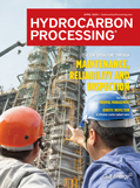Project Management
Online Exclusive: Strategies for dealing with rising construction costs
Thorough risk assessment and evaluation of alternatives are keys to success as capital projects continue to experience delays and the potential for cost overruns.
ADNOC sends first low-carbon ammonia shipment from the UAE to Germany
ADNOC announced that its first shipment of low-carbon ammonia has left the United Arab Emirates bound for Hamburg, Germany. This is the first ever cargo of low-carbon ammonia to be shipped to Germany.
History of the HPI: The 2000s: Net-zero, environmental regulations, capacity acceleration and digital transformation
This final installment of the History of the HPI series details major events in the refining and petrochemicals industry over the past 20 yr, including stricter regulations/initiatives to curb carbon emissions, a safer and more environmentally friendly way to produce and handle chemicals, significant capital investments to boost production capacity and digital transformation.
INEOS Phenol adds 1 MMt of production capacity as it acquires Mitsui Phenols Singapore Ltd for $330 MM
INEOS Phenol announced that it has agreed to acquire the entire asset base of Mitsui Phenols Singapore Ltd from Mitsui Chemicals, a leading Japanese chemicals manufacturer, for a total consideration of $330 MM.
OPC Foundation and FieldComm Group to develop an instrumentation device profile for OPC UA Field eXchange
The aim is to provide an interoperable interface between PLC / DCS and instrumentation devices, such as transmitters, instruments, and actuators. The solution shall support different industries such as oil & gas, pharmaceuticals, chemicals, energy, water & wastewater, and pulp & paper.
Terra Drone Corporation & NDT CCS performs visual inspection of Adnoc Refining's RFCC facilities
The pilot project this time was carried out to prove that drones can be used for internal visual inspections at RFCC facilities, especially in reactors, cyclones, and boilers.
L&T wins contract from Indian Oil Corporation
IOCL is implementing the Panipat Refinery Expansion (P-25) Project to enhance refining capacity from 15 MMtpy to 25 MMtpy to meet the growth in demand of petroleum products and to increase their profitability and competitiveness in the long run.
JG Summit Olefins selects Aspen Technology to advance operations
Aspen Technology announced that JG Summit Olefins Corporation, is advancing its journey toward operational excellence by unlocking untapped value in production optimization.
Siemens closes Brightly acquisition, elevating software offering for building operations
Siemens Smart Infrastructure has completed the acquisition of Brightly Software, a U.S.-based SaaS provider of asset and maintenance management solutions.
Corpus Christi Polymers awards Worley contracts for facilities producing plastics
Corpus Christi Polymers has awarded Worley construction management and general services contracts. The scope of the construction management contract includes Corpus Christi’s new PET and PTA facilities in Corpus Christi, Texas, USA.

- Holland America starts pilot tests using renewable fuels on cruise liner 5/3
- U.S. admin sets path for ethanol aviation fuel subsidies 5/3
- Ryazan refinery (Russia) hit by drone strike 5/3
- Novatek's new Ust-Luga condensate unit set for June testing 5/3
- Thiozen pilot successfully produces zero-emission H2 from sour gas waste streams 5/3
- Mexico's Pemex exported 20,000 bpd of crude, fuel to Cuba in H2 2023 5/3




